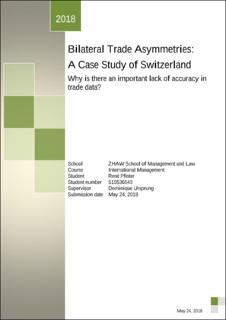Please use this identifier to cite or link to this item:
https://doi.org/10.21256/zhaw-2323Full metadata record
| DC Field | Value | Language |
|---|---|---|
| dc.contributor.advisor | Ursprung, Dominique | - |
| dc.contributor.author | Pfister, René | - |
| dc.date.accessioned | 2018-11-30T14:56:46Z | - |
| dc.date.available | 2018-11-30T14:56:46Z | - |
| dc.date.issued | 2018 | - |
| dc.identifier.uri | https://digitalcollection.zhaw.ch/handle/11475/13447 | - |
| dc.description.abstract | The accuracy of international trade data can be rather questionable as in some cases large asymmetries in bilateral trade statistics result. Bilateral trade asymmetries are also referred to as mirror discrepancies and occur when the declared value of a country's imports does not correspond to the value of exports declared by its trading partner. Such mirror discrepancies are problematic because they jeopardize the quality of international merchandise trade statistics (IMTS) and thus lead to misreported bilateral deficits or surpluses, which in turn can motivate policy-makers to adopt ill-considered economic decisions. In order to improve the overall quality of IMTS, it is of utmost importance to understand the various factors that lead to mirror discrepancies. | de_CH |
| dc.format.extent | 128 | de_CH |
| dc.language.iso | en | de_CH |
| dc.publisher | ZHAW Zürcher Hochschule für Angewandte Wissenschaften | de_CH |
| dc.rights | https://creativecommons.org/licenses/by-nc-nd/4.0/ | de_CH |
| dc.subject.ddc | 337: Weltwirtschaft und Handel | de_CH |
| dc.title | Bilateral trade asymmetries: a case study of Switzerland : why is there an important lack of accuracy in trade data? | de_CH |
| dc.type | Thesis: Bachelor | de_CH |
| dcterms.type | Text | de_CH |
| zhaw.departement | School of Management and Law | de_CH |
| zhaw.publisher.place | Winterthur | de_CH |
| dc.identifier.doi | 10.21256/zhaw-2323 | - |
| zhaw.originated.zhaw | Yes | de_CH |
| Appears in collections: | BSc International Management | |
Files in This Item:
| File | Description | Size | Format | |
|---|---|---|---|---|
| BT_Bilateral Trade Asymmetries_René Pfister.pdf | 2.77 MB | Adobe PDF |  View/Open |
Show simple item record
Pfister, R. (2018). Bilateral trade asymmetries: a case study of Switzerland : why is there an important lack of accuracy in trade data? [Bachelor’s thesis, ZHAW Zürcher Hochschule für Angewandte Wissenschaften]. https://doi.org/10.21256/zhaw-2323
Pfister, R. (2018) Bilateral trade asymmetries: a case study of Switzerland : why is there an important lack of accuracy in trade data? Bachelor’s thesis. ZHAW Zürcher Hochschule für Angewandte Wissenschaften. Available at: https://doi.org/10.21256/zhaw-2323.
R. Pfister, “Bilateral trade asymmetries: a case study of Switzerland : why is there an important lack of accuracy in trade data?,” Bachelor’s thesis, ZHAW Zürcher Hochschule für Angewandte Wissenschaften, Winterthur, 2018. doi: 10.21256/zhaw-2323.
PFISTER, René, 2018. Bilateral trade asymmetries: a case study of Switzerland : why is there an important lack of accuracy in trade data? Bachelor’s thesis. Winterthur: ZHAW Zürcher Hochschule für Angewandte Wissenschaften
Pfister, René. 2018. “Bilateral Trade Asymmetries: A Case Study of Switzerland : Why Is There an Important Lack of Accuracy in Trade Data?” Bachelor’s thesis, Winterthur: ZHAW Zürcher Hochschule für Angewandte Wissenschaften. https://doi.org/10.21256/zhaw-2323.
Pfister, René. Bilateral Trade Asymmetries: A Case Study of Switzerland : Why Is There an Important Lack of Accuracy in Trade Data? ZHAW Zürcher Hochschule für Angewandte Wissenschaften, 2018, https://doi.org/10.21256/zhaw-2323.
Items in DSpace are protected by copyright, with all rights reserved, unless otherwise indicated.